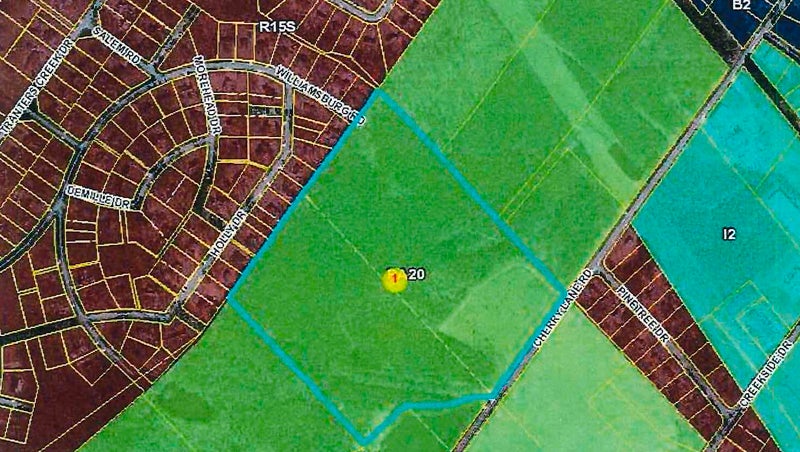Council expected to determine fate of rezoning request
Published 10:28 pm Sunday, August 12, 2018

- ZONING CHANGE SOUGHT: A sand mine could be located in the area outlined in blue if Washington’s zoning regulations are amended to allow such a use in the RA-20 zoning districts.
Washington’s City Council, during its meeting today, will try again to have a second reading on a proposal to amend the city’s zoning regulations to allow mining operations in the residential/agricultural-20 zones with a special-use permit, which would be issued by the Board of Adjustment.
At its July 9 meeting, the council removed a scheduled second reading on the proposal from its agenda.
At its June 11 meeting, the council voted 3-2 on a motion to allow mining operations in the RA-20 zones, but that 3-2 vote was not enough for the motion to pass. For that motion to have passed, two-thirds of the council members would have needed to vote for it on the first reading of the proposed amendment. If the council votes on the request again, a simple majority vote in the affirmative would allow the motion to pass.
At that June 11 meeting, Council members Virginia Finnerty, Richard Brooks and Roland Wyman voted in the affirmative during the council’s meeting Monday. Council members Doug Mercer and William Pitt voted in the negative. The Planning Board had recommended the council not amend the zoning regulations.
During its March meeting, the board decided it wanted to discuss the request with B.E. Singleton & Sons and its consultant, Harry Bailey, before making a recommendation to the council, which as final say on amending the zoning ordinances. B.E. Singleton & Sons wants to mine sand on a parcel of land on Cherry Lane Road, which is located within the city’s extra-territorial jurisdiction. Roper-based Sly Fox Farm LLC owns the land, which is on the west side of Cherry Lane Road. Fly Fox Farm has no objection to the land being mined for sand.
At its May meeting, the Planning Board voted to recommend the rezoning request be denied. At that May meeting, Bailey and Charles E. Manning III, president of B.E. Singleton & Sons, discussed the proposed sand-mine site and activities with the board. They said the sand-mine operations would not significantly affect traffic in the area, increase noise levels or adversely affect the quality of groundwater, from which some residents in the area draw their drinking water.
“There’ll be no blasting. There’ll be no pumping of water, so adjacent wells will not be affected,” Manning said during an interview in April.
Several residents who live adjacent to the proposed mine site questioned those statements, adding that a mining operation would disrupt the residential character of the area. They said a proposed 300-foot buffer between their houses and the mine would not be adequate to prevent noise and dust from reaching their houses. Their concerns were similar to concerns raised by board members in March.
“You’re going to have noise there. … I would say no to this for sure,” Vito Maurizzio told the board.
Board members questioned if mining operations are appropriate in areas that are mostly residential.
“I don’t want it in my backyard. I don’t want it in their backyards,” board member Jane Alligood said.






